Knowledge Management in E-Commerce: BUS5KMS La Trobe Business School
VerifiedAdded on 2023/06/12
|12
|3172
|189
Report
AI Summary
This report discusses the adoption of e-business and the importance of knowledge management in ensuring consumer security and privacy. It explores e-commerce acceptance models like the Theory of Planned Behavior, and the role of knowledge management systems in addressing issues like increasing domain complexity and market volatility. The report identifies accessibility and convenience as major drivers of e-commerce, while security risks and limited computer experience are significant barriers. It highlights the knowledge management process, including knowledge creation, storage, transfer, and application, and discusses the benefits of knowledge management tools in organizing customer requirements, supporting decision-making, and storing customer information. The conclusion emphasizes the need for e-business organizations to develop robust knowledge management systems to protect customer information and build trust.
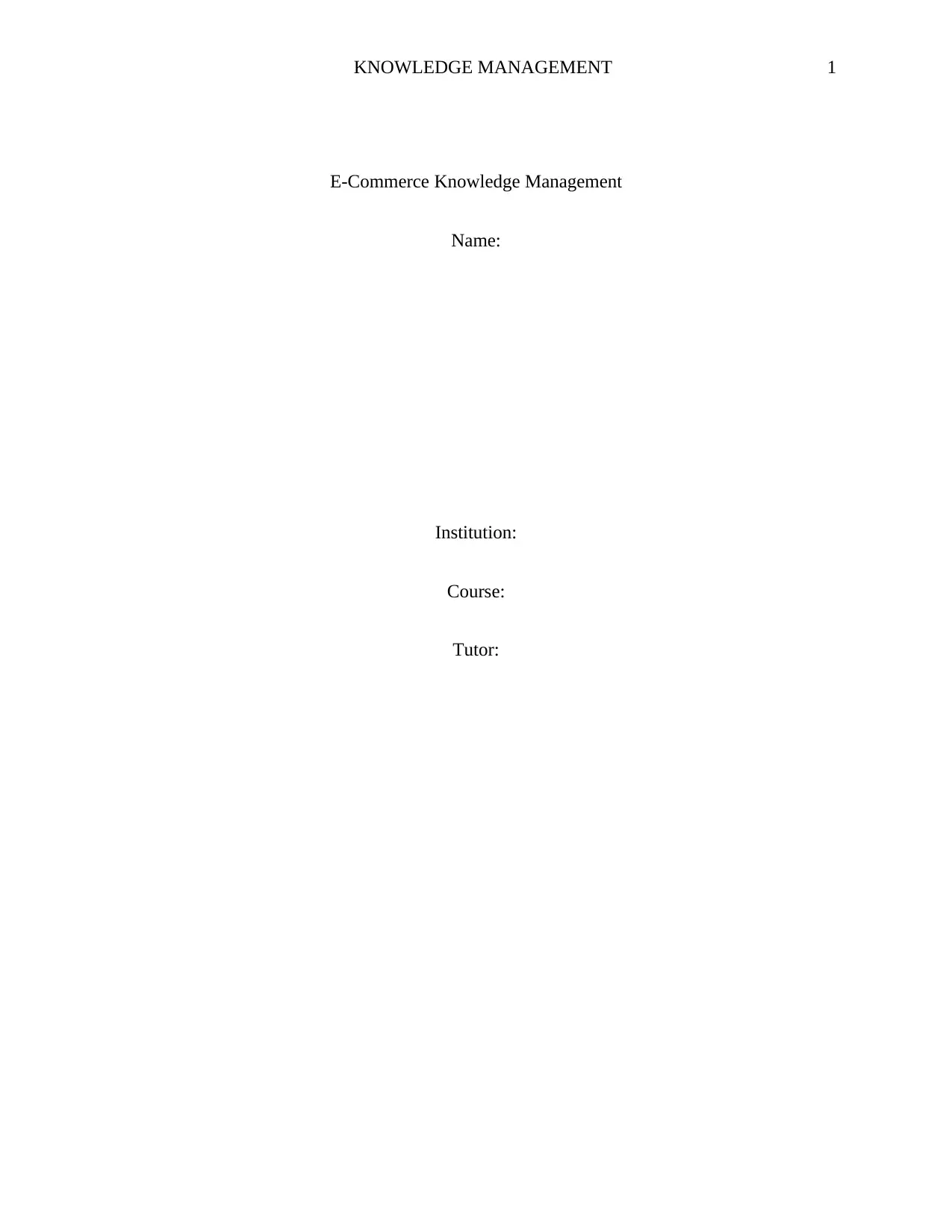
KNOWLEDGE MANAGEMENT 1
E-Commerce Knowledge Management
Name:
Institution:
Course:
Tutor:
E-Commerce Knowledge Management
Name:
Institution:
Course:
Tutor:
Paraphrase This Document
Need a fresh take? Get an instant paraphrase of this document with our AI Paraphraser
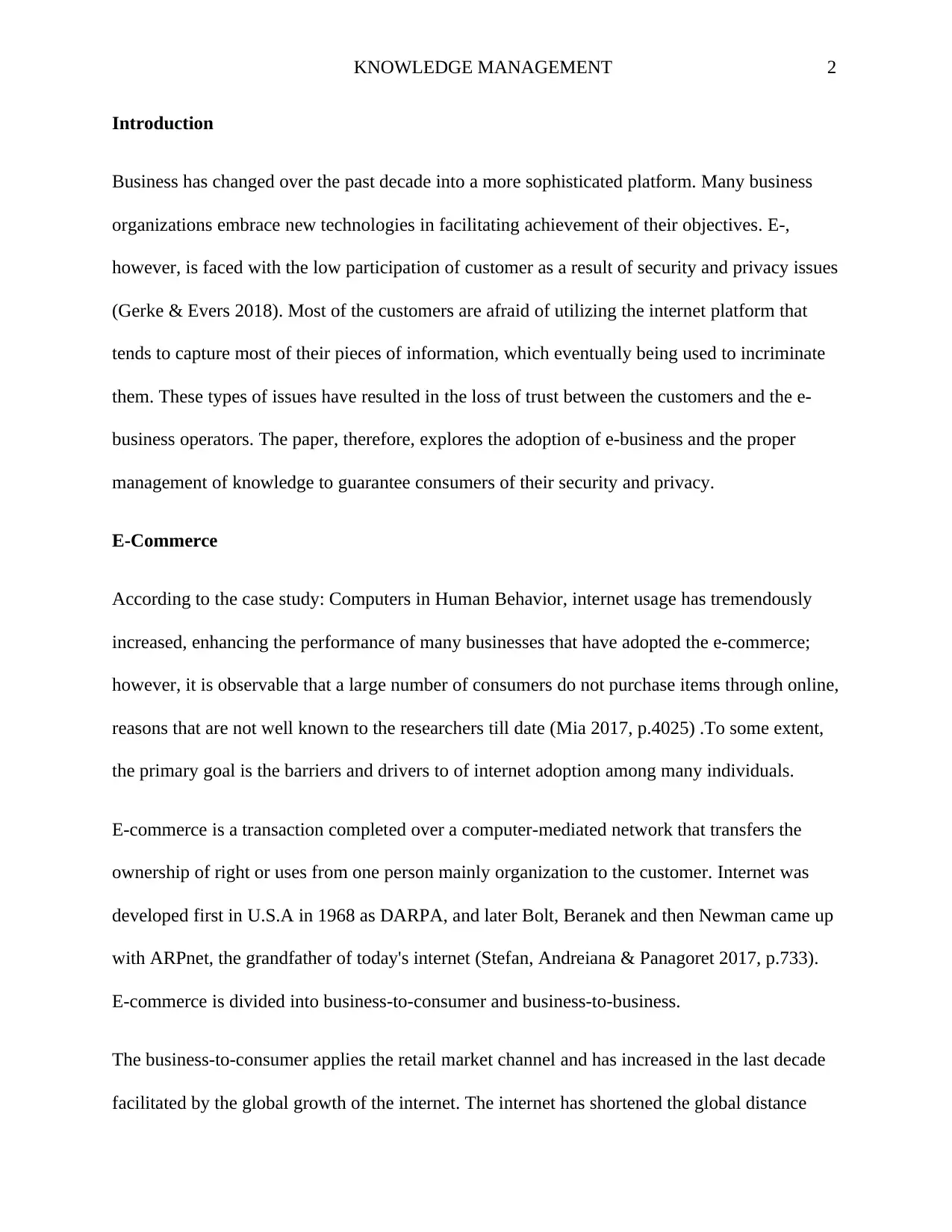
KNOWLEDGE MANAGEMENT 2
Introduction
Business has changed over the past decade into a more sophisticated platform. Many business
organizations embrace new technologies in facilitating achievement of their objectives. E-,
however, is faced with the low participation of customer as a result of security and privacy issues
(Gerke & Evers 2018). Most of the customers are afraid of utilizing the internet platform that
tends to capture most of their pieces of information, which eventually being used to incriminate
them. These types of issues have resulted in the loss of trust between the customers and the e-
business operators. The paper, therefore, explores the adoption of e-business and the proper
management of knowledge to guarantee consumers of their security and privacy.
E-Commerce
According to the case study: Computers in Human Behavior, internet usage has tremendously
increased, enhancing the performance of many businesses that have adopted the e-commerce;
however, it is observable that a large number of consumers do not purchase items through online,
reasons that are not well known to the researchers till date (Mia 2017, p.4025) .To some extent,
the primary goal is the barriers and drivers to of internet adoption among many individuals.
E-commerce is a transaction completed over a computer-mediated network that transfers the
ownership of right or uses from one person mainly organization to the customer. Internet was
developed first in U.S.A in 1968 as DARPA, and later Bolt, Beranek and then Newman came up
with ARPnet, the grandfather of today's internet (Stefan, Andreiana & Panagoret 2017, p.733).
E-commerce is divided into business-to-consumer and business-to-business.
The business-to-consumer applies the retail market channel and has increased in the last decade
facilitated by the global growth of the internet. The internet has shortened the global distance
Introduction
Business has changed over the past decade into a more sophisticated platform. Many business
organizations embrace new technologies in facilitating achievement of their objectives. E-,
however, is faced with the low participation of customer as a result of security and privacy issues
(Gerke & Evers 2018). Most of the customers are afraid of utilizing the internet platform that
tends to capture most of their pieces of information, which eventually being used to incriminate
them. These types of issues have resulted in the loss of trust between the customers and the e-
business operators. The paper, therefore, explores the adoption of e-business and the proper
management of knowledge to guarantee consumers of their security and privacy.
E-Commerce
According to the case study: Computers in Human Behavior, internet usage has tremendously
increased, enhancing the performance of many businesses that have adopted the e-commerce;
however, it is observable that a large number of consumers do not purchase items through online,
reasons that are not well known to the researchers till date (Mia 2017, p.4025) .To some extent,
the primary goal is the barriers and drivers to of internet adoption among many individuals.
E-commerce is a transaction completed over a computer-mediated network that transfers the
ownership of right or uses from one person mainly organization to the customer. Internet was
developed first in U.S.A in 1968 as DARPA, and later Bolt, Beranek and then Newman came up
with ARPnet, the grandfather of today's internet (Stefan, Andreiana & Panagoret 2017, p.733).
E-commerce is divided into business-to-consumer and business-to-business.
The business-to-consumer applies the retail market channel and has increased in the last decade
facilitated by the global growth of the internet. The internet has shortened the global distance
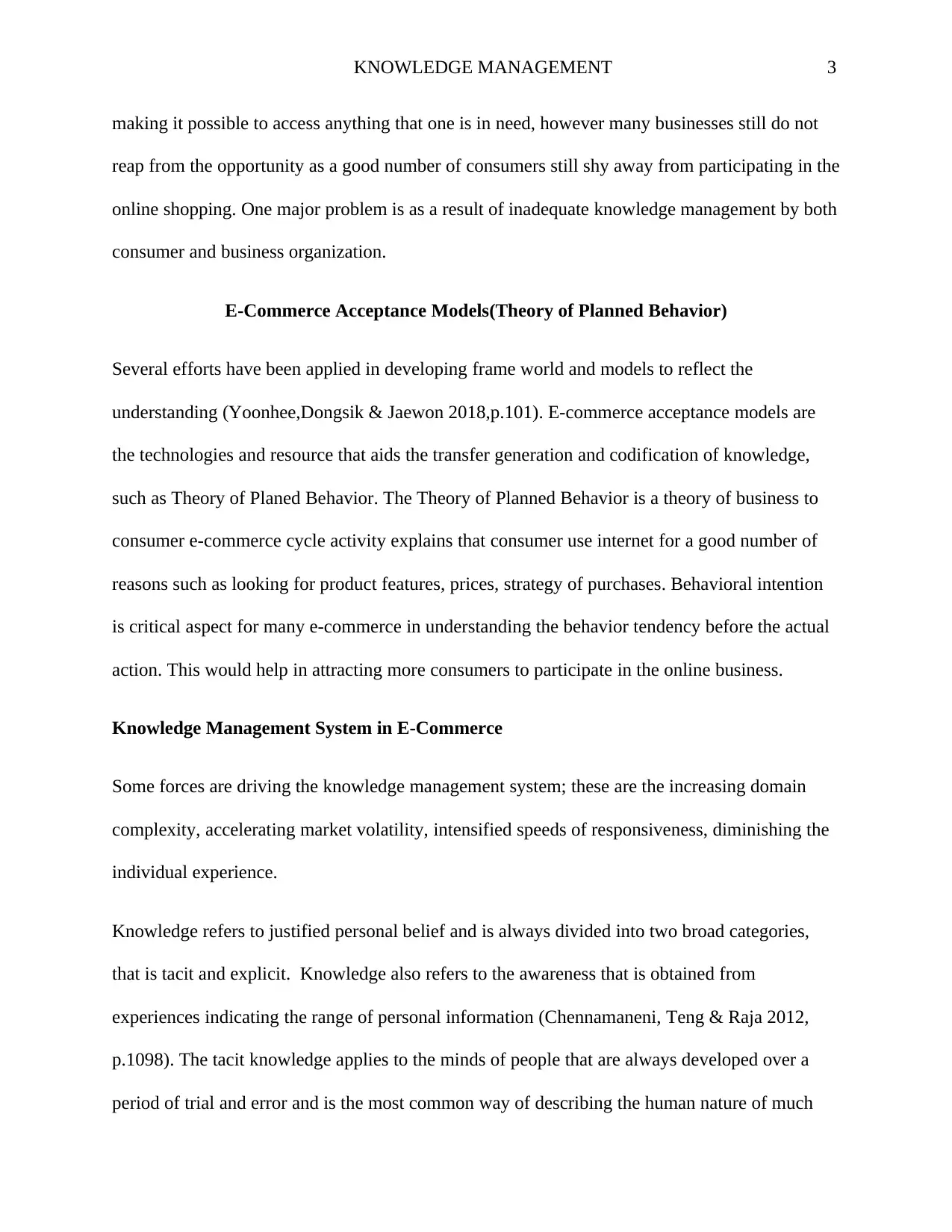
KNOWLEDGE MANAGEMENT 3
making it possible to access anything that one is in need, however many businesses still do not
reap from the opportunity as a good number of consumers still shy away from participating in the
online shopping. One major problem is as a result of inadequate knowledge management by both
consumer and business organization.
E-Commerce Acceptance Models(Theory of Planned Behavior)
Several efforts have been applied in developing frame world and models to reflect the
understanding (Yoonhee,Dongsik & Jaewon 2018,p.101). E-commerce acceptance models are
the technologies and resource that aids the transfer generation and codification of knowledge,
such as Theory of Planed Behavior. The Theory of Planned Behavior is a theory of business to
consumer e-commerce cycle activity explains that consumer use internet for a good number of
reasons such as looking for product features, prices, strategy of purchases. Behavioral intention
is critical aspect for many e-commerce in understanding the behavior tendency before the actual
action. This would help in attracting more consumers to participate in the online business.
Knowledge Management System in E-Commerce
Some forces are driving the knowledge management system; these are the increasing domain
complexity, accelerating market volatility, intensified speeds of responsiveness, diminishing the
individual experience.
Knowledge refers to justified personal belief and is always divided into two broad categories,
that is tacit and explicit. Knowledge also refers to the awareness that is obtained from
experiences indicating the range of personal information (Chennamaneni, Teng & Raja 2012,
p.1098). The tacit knowledge applies to the minds of people that are always developed over a
period of trial and error and is the most common way of describing the human nature of much
making it possible to access anything that one is in need, however many businesses still do not
reap from the opportunity as a good number of consumers still shy away from participating in the
online shopping. One major problem is as a result of inadequate knowledge management by both
consumer and business organization.
E-Commerce Acceptance Models(Theory of Planned Behavior)
Several efforts have been applied in developing frame world and models to reflect the
understanding (Yoonhee,Dongsik & Jaewon 2018,p.101). E-commerce acceptance models are
the technologies and resource that aids the transfer generation and codification of knowledge,
such as Theory of Planed Behavior. The Theory of Planned Behavior is a theory of business to
consumer e-commerce cycle activity explains that consumer use internet for a good number of
reasons such as looking for product features, prices, strategy of purchases. Behavioral intention
is critical aspect for many e-commerce in understanding the behavior tendency before the actual
action. This would help in attracting more consumers to participate in the online business.
Knowledge Management System in E-Commerce
Some forces are driving the knowledge management system; these are the increasing domain
complexity, accelerating market volatility, intensified speeds of responsiveness, diminishing the
individual experience.
Knowledge refers to justified personal belief and is always divided into two broad categories,
that is tacit and explicit. Knowledge also refers to the awareness that is obtained from
experiences indicating the range of personal information (Chennamaneni, Teng & Raja 2012,
p.1098). The tacit knowledge applies to the minds of people that are always developed over a
period of trial and error and is the most common way of describing the human nature of much
⊘ This is a preview!⊘
Do you want full access?
Subscribe today to unlock all pages.

Trusted by 1+ million students worldwide
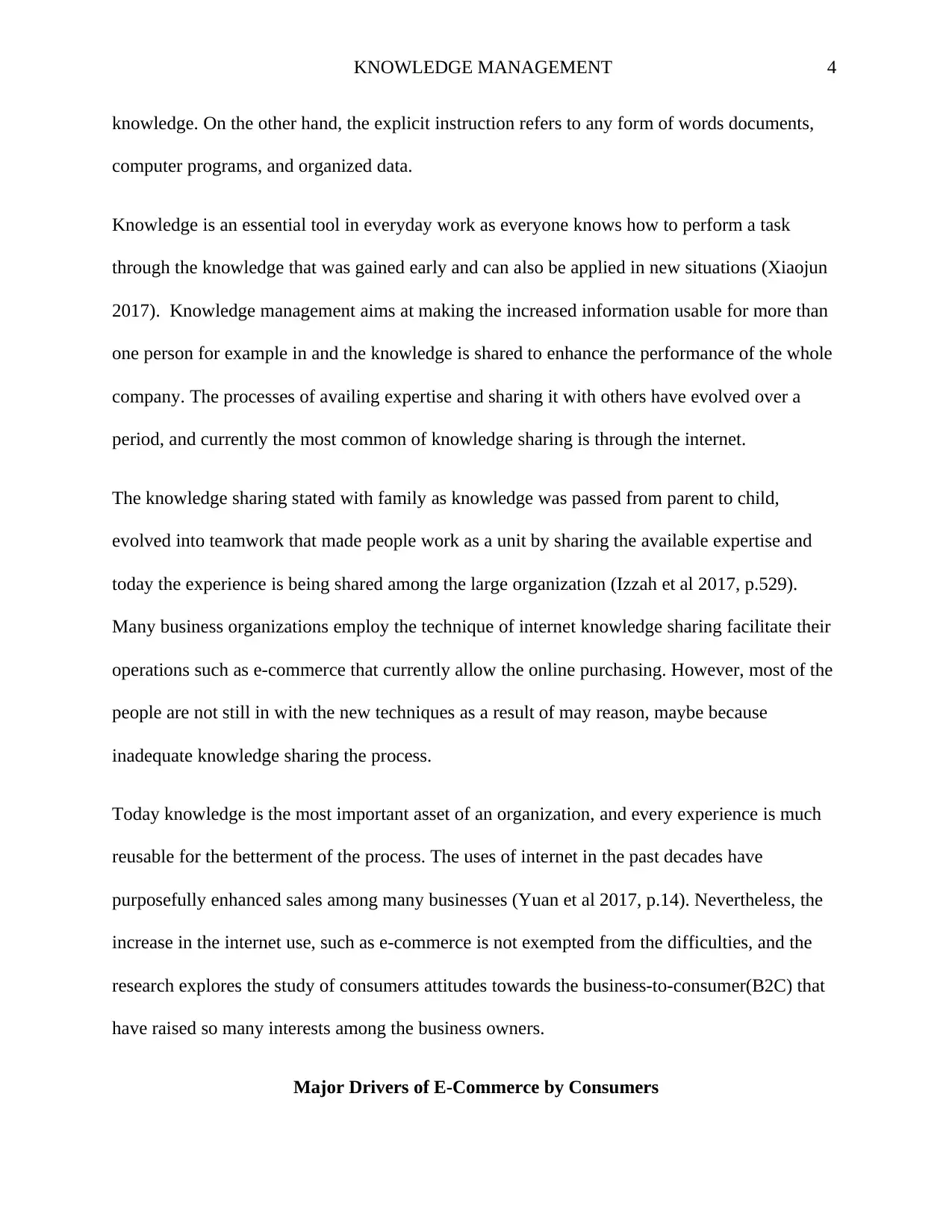
KNOWLEDGE MANAGEMENT 4
knowledge. On the other hand, the explicit instruction refers to any form of words documents,
computer programs, and organized data.
Knowledge is an essential tool in everyday work as everyone knows how to perform a task
through the knowledge that was gained early and can also be applied in new situations (Xiaojun
2017). Knowledge management aims at making the increased information usable for more than
one person for example in and the knowledge is shared to enhance the performance of the whole
company. The processes of availing expertise and sharing it with others have evolved over a
period, and currently the most common of knowledge sharing is through the internet.
The knowledge sharing stated with family as knowledge was passed from parent to child,
evolved into teamwork that made people work as a unit by sharing the available expertise and
today the experience is being shared among the large organization (Izzah et al 2017, p.529).
Many business organizations employ the technique of internet knowledge sharing facilitate their
operations such as e-commerce that currently allow the online purchasing. However, most of the
people are not still in with the new techniques as a result of may reason, maybe because
inadequate knowledge sharing the process.
Today knowledge is the most important asset of an organization, and every experience is much
reusable for the betterment of the process. The uses of internet in the past decades have
purposefully enhanced sales among many businesses (Yuan et al 2017, p.14). Nevertheless, the
increase in the internet use, such as e-commerce is not exempted from the difficulties, and the
research explores the study of consumers attitudes towards the business-to-consumer(B2C) that
have raised so many interests among the business owners.
Major Drivers of E-Commerce by Consumers
knowledge. On the other hand, the explicit instruction refers to any form of words documents,
computer programs, and organized data.
Knowledge is an essential tool in everyday work as everyone knows how to perform a task
through the knowledge that was gained early and can also be applied in new situations (Xiaojun
2017). Knowledge management aims at making the increased information usable for more than
one person for example in and the knowledge is shared to enhance the performance of the whole
company. The processes of availing expertise and sharing it with others have evolved over a
period, and currently the most common of knowledge sharing is through the internet.
The knowledge sharing stated with family as knowledge was passed from parent to child,
evolved into teamwork that made people work as a unit by sharing the available expertise and
today the experience is being shared among the large organization (Izzah et al 2017, p.529).
Many business organizations employ the technique of internet knowledge sharing facilitate their
operations such as e-commerce that currently allow the online purchasing. However, most of the
people are not still in with the new techniques as a result of may reason, maybe because
inadequate knowledge sharing the process.
Today knowledge is the most important asset of an organization, and every experience is much
reusable for the betterment of the process. The uses of internet in the past decades have
purposefully enhanced sales among many businesses (Yuan et al 2017, p.14). Nevertheless, the
increase in the internet use, such as e-commerce is not exempted from the difficulties, and the
research explores the study of consumers attitudes towards the business-to-consumer(B2C) that
have raised so many interests among the business owners.
Major Drivers of E-Commerce by Consumers
Paraphrase This Document
Need a fresh take? Get an instant paraphrase of this document with our AI Paraphraser
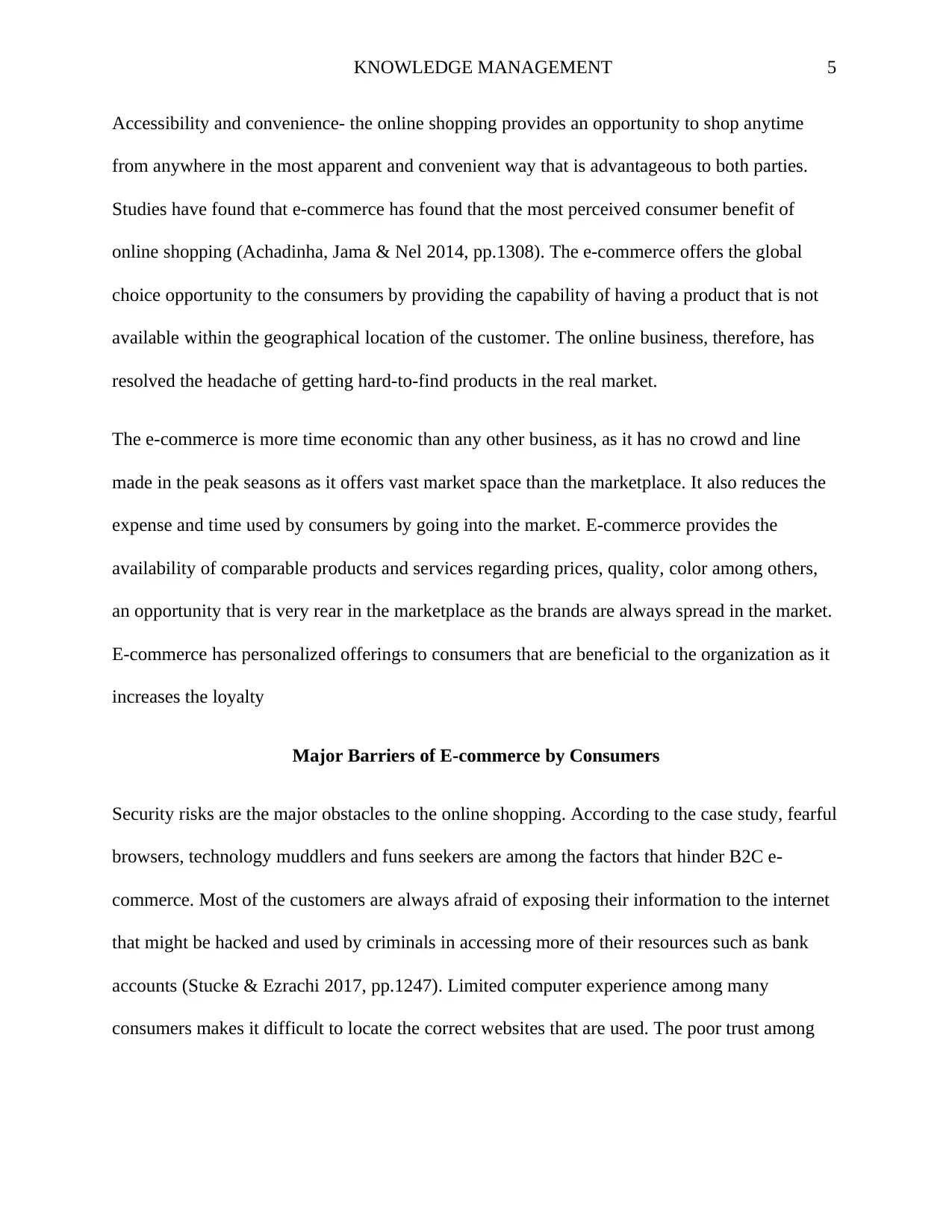
KNOWLEDGE MANAGEMENT 5
Accessibility and convenience- the online shopping provides an opportunity to shop anytime
from anywhere in the most apparent and convenient way that is advantageous to both parties.
Studies have found that e-commerce has found that the most perceived consumer benefit of
online shopping (Achadinha, Jama & Nel 2014, pp.1308). The e-commerce offers the global
choice opportunity to the consumers by providing the capability of having a product that is not
available within the geographical location of the customer. The online business, therefore, has
resolved the headache of getting hard-to-find products in the real market.
The e-commerce is more time economic than any other business, as it has no crowd and line
made in the peak seasons as it offers vast market space than the marketplace. It also reduces the
expense and time used by consumers by going into the market. E-commerce provides the
availability of comparable products and services regarding prices, quality, color among others,
an opportunity that is very rear in the marketplace as the brands are always spread in the market.
E-commerce has personalized offerings to consumers that are beneficial to the organization as it
increases the loyalty
Major Barriers of E-commerce by Consumers
Security risks are the major obstacles to the online shopping. According to the case study, fearful
browsers, technology muddlers and funs seekers are among the factors that hinder B2C e-
commerce. Most of the customers are always afraid of exposing their information to the internet
that might be hacked and used by criminals in accessing more of their resources such as bank
accounts (Stucke & Ezrachi 2017, pp.1247). Limited computer experience among many
consumers makes it difficult to locate the correct websites that are used. The poor trust among
Accessibility and convenience- the online shopping provides an opportunity to shop anytime
from anywhere in the most apparent and convenient way that is advantageous to both parties.
Studies have found that e-commerce has found that the most perceived consumer benefit of
online shopping (Achadinha, Jama & Nel 2014, pp.1308). The e-commerce offers the global
choice opportunity to the consumers by providing the capability of having a product that is not
available within the geographical location of the customer. The online business, therefore, has
resolved the headache of getting hard-to-find products in the real market.
The e-commerce is more time economic than any other business, as it has no crowd and line
made in the peak seasons as it offers vast market space than the marketplace. It also reduces the
expense and time used by consumers by going into the market. E-commerce provides the
availability of comparable products and services regarding prices, quality, color among others,
an opportunity that is very rear in the marketplace as the brands are always spread in the market.
E-commerce has personalized offerings to consumers that are beneficial to the organization as it
increases the loyalty
Major Barriers of E-commerce by Consumers
Security risks are the major obstacles to the online shopping. According to the case study, fearful
browsers, technology muddlers and funs seekers are among the factors that hinder B2C e-
commerce. Most of the customers are always afraid of exposing their information to the internet
that might be hacked and used by criminals in accessing more of their resources such as bank
accounts (Stucke & Ezrachi 2017, pp.1247). Limited computer experience among many
consumers makes it difficult to locate the correct websites that are used. The poor trust among
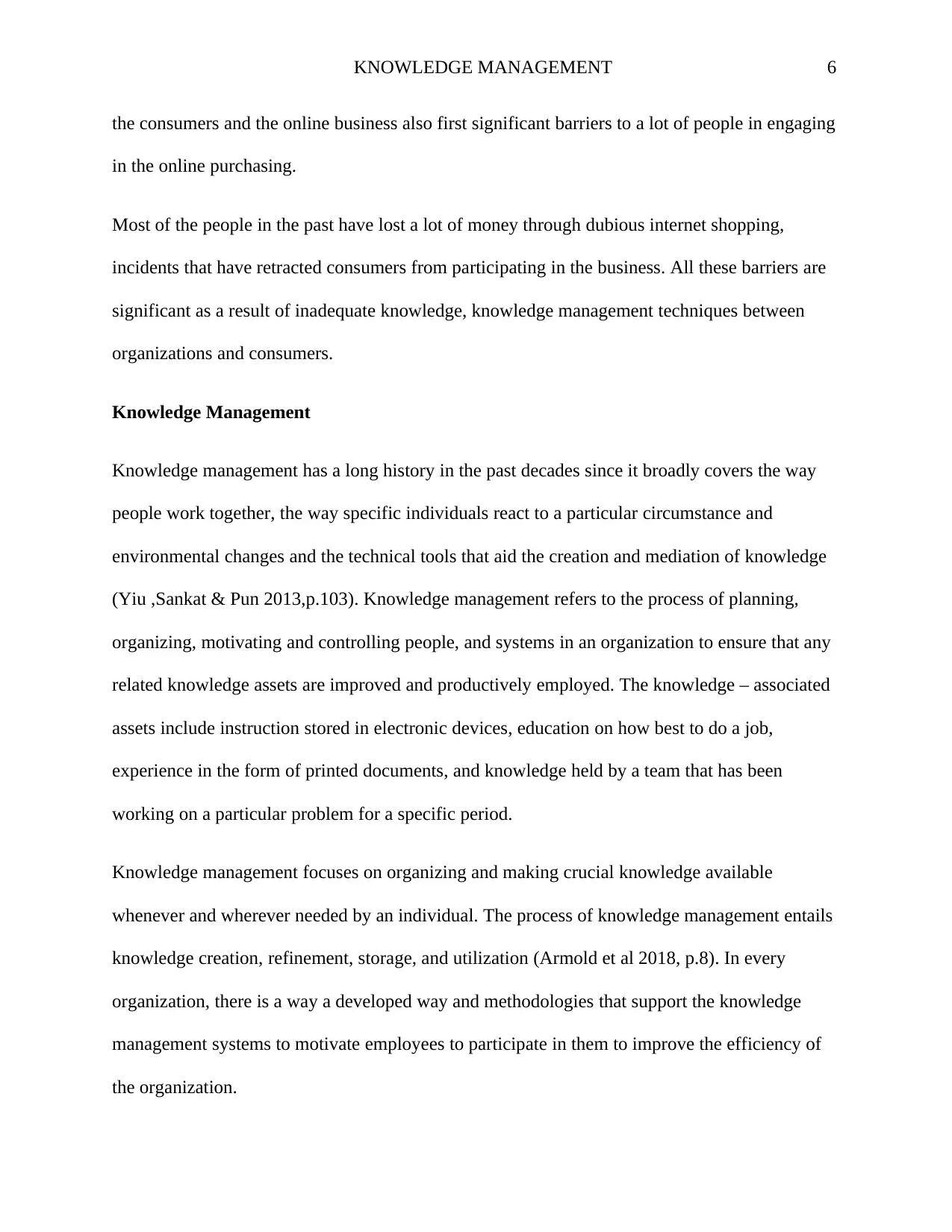
KNOWLEDGE MANAGEMENT 6
the consumers and the online business also first significant barriers to a lot of people in engaging
in the online purchasing.
Most of the people in the past have lost a lot of money through dubious internet shopping,
incidents that have retracted consumers from participating in the business. All these barriers are
significant as a result of inadequate knowledge, knowledge management techniques between
organizations and consumers.
Knowledge Management
Knowledge management has a long history in the past decades since it broadly covers the way
people work together, the way specific individuals react to a particular circumstance and
environmental changes and the technical tools that aid the creation and mediation of knowledge
(Yiu ,Sankat & Pun 2013,p.103). Knowledge management refers to the process of planning,
organizing, motivating and controlling people, and systems in an organization to ensure that any
related knowledge assets are improved and productively employed. The knowledge – associated
assets include instruction stored in electronic devices, education on how best to do a job,
experience in the form of printed documents, and knowledge held by a team that has been
working on a particular problem for a specific period.
Knowledge management focuses on organizing and making crucial knowledge available
whenever and wherever needed by an individual. The process of knowledge management entails
knowledge creation, refinement, storage, and utilization (Armold et al 2018, p.8). In every
organization, there is a way a developed way and methodologies that support the knowledge
management systems to motivate employees to participate in them to improve the efficiency of
the organization.
the consumers and the online business also first significant barriers to a lot of people in engaging
in the online purchasing.
Most of the people in the past have lost a lot of money through dubious internet shopping,
incidents that have retracted consumers from participating in the business. All these barriers are
significant as a result of inadequate knowledge, knowledge management techniques between
organizations and consumers.
Knowledge Management
Knowledge management has a long history in the past decades since it broadly covers the way
people work together, the way specific individuals react to a particular circumstance and
environmental changes and the technical tools that aid the creation and mediation of knowledge
(Yiu ,Sankat & Pun 2013,p.103). Knowledge management refers to the process of planning,
organizing, motivating and controlling people, and systems in an organization to ensure that any
related knowledge assets are improved and productively employed. The knowledge – associated
assets include instruction stored in electronic devices, education on how best to do a job,
experience in the form of printed documents, and knowledge held by a team that has been
working on a particular problem for a specific period.
Knowledge management focuses on organizing and making crucial knowledge available
whenever and wherever needed by an individual. The process of knowledge management entails
knowledge creation, refinement, storage, and utilization (Armold et al 2018, p.8). In every
organization, there is a way a developed way and methodologies that support the knowledge
management systems to motivate employees to participate in them to improve the efficiency of
the organization.
⊘ This is a preview!⊘
Do you want full access?
Subscribe today to unlock all pages.

Trusted by 1+ million students worldwide
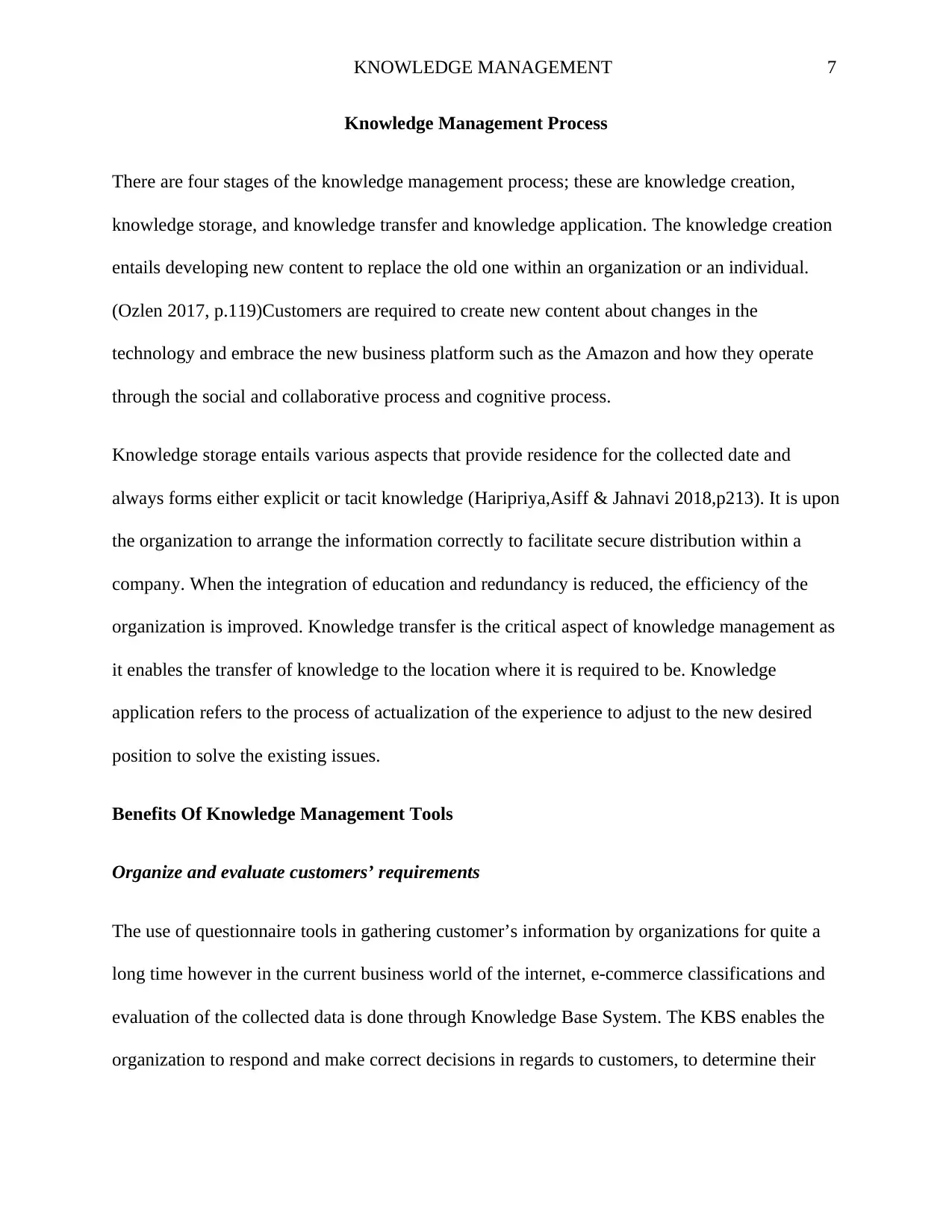
KNOWLEDGE MANAGEMENT 7
Knowledge Management Process
There are four stages of the knowledge management process; these are knowledge creation,
knowledge storage, and knowledge transfer and knowledge application. The knowledge creation
entails developing new content to replace the old one within an organization or an individual.
(Ozlen 2017, p.119)Customers are required to create new content about changes in the
technology and embrace the new business platform such as the Amazon and how they operate
through the social and collaborative process and cognitive process.
Knowledge storage entails various aspects that provide residence for the collected date and
always forms either explicit or tacit knowledge (Haripriya,Asiff & Jahnavi 2018,p213). It is upon
the organization to arrange the information correctly to facilitate secure distribution within a
company. When the integration of education and redundancy is reduced, the efficiency of the
organization is improved. Knowledge transfer is the critical aspect of knowledge management as
it enables the transfer of knowledge to the location where it is required to be. Knowledge
application refers to the process of actualization of the experience to adjust to the new desired
position to solve the existing issues.
Benefits Of Knowledge Management Tools
Organize and evaluate customers’ requirements
The use of questionnaire tools in gathering customer’s information by organizations for quite a
long time however in the current business world of the internet, e-commerce classifications and
evaluation of the collected data is done through Knowledge Base System. The KBS enables the
organization to respond and make correct decisions in regards to customers, to determine their
Knowledge Management Process
There are four stages of the knowledge management process; these are knowledge creation,
knowledge storage, and knowledge transfer and knowledge application. The knowledge creation
entails developing new content to replace the old one within an organization or an individual.
(Ozlen 2017, p.119)Customers are required to create new content about changes in the
technology and embrace the new business platform such as the Amazon and how they operate
through the social and collaborative process and cognitive process.
Knowledge storage entails various aspects that provide residence for the collected date and
always forms either explicit or tacit knowledge (Haripriya,Asiff & Jahnavi 2018,p213). It is upon
the organization to arrange the information correctly to facilitate secure distribution within a
company. When the integration of education and redundancy is reduced, the efficiency of the
organization is improved. Knowledge transfer is the critical aspect of knowledge management as
it enables the transfer of knowledge to the location where it is required to be. Knowledge
application refers to the process of actualization of the experience to adjust to the new desired
position to solve the existing issues.
Benefits Of Knowledge Management Tools
Organize and evaluate customers’ requirements
The use of questionnaire tools in gathering customer’s information by organizations for quite a
long time however in the current business world of the internet, e-commerce classifications and
evaluation of the collected data is done through Knowledge Base System. The KBS enables the
organization to respond and make correct decisions in regards to customers, to determine their
Paraphrase This Document
Need a fresh take? Get an instant paraphrase of this document with our AI Paraphraser
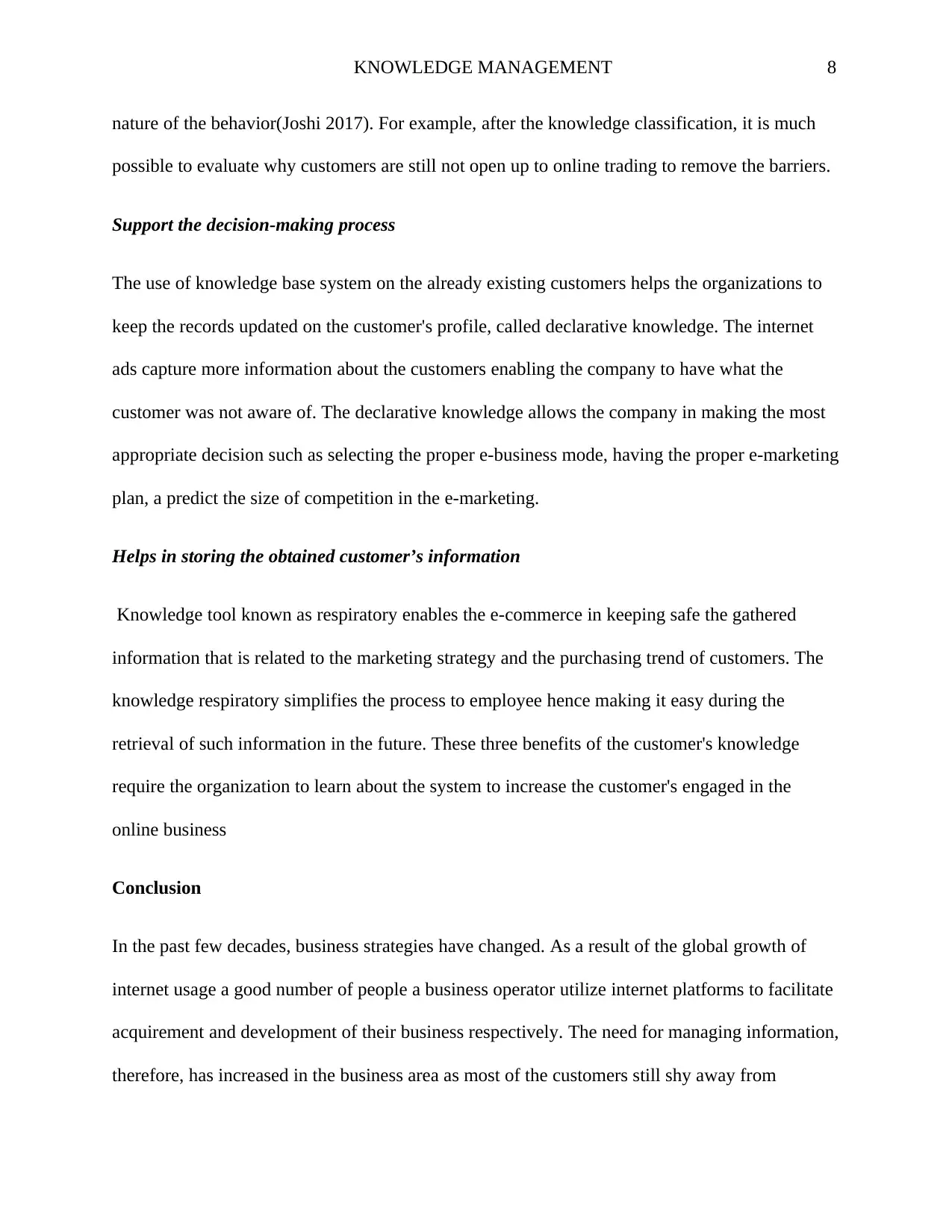
KNOWLEDGE MANAGEMENT 8
nature of the behavior(Joshi 2017). For example, after the knowledge classification, it is much
possible to evaluate why customers are still not open up to online trading to remove the barriers.
Support the decision-making process
The use of knowledge base system on the already existing customers helps the organizations to
keep the records updated on the customer's profile, called declarative knowledge. The internet
ads capture more information about the customers enabling the company to have what the
customer was not aware of. The declarative knowledge allows the company in making the most
appropriate decision such as selecting the proper e-business mode, having the proper e-marketing
plan, a predict the size of competition in the e-marketing.
Helps in storing the obtained customer’s information
Knowledge tool known as respiratory enables the e-commerce in keeping safe the gathered
information that is related to the marketing strategy and the purchasing trend of customers. The
knowledge respiratory simplifies the process to employee hence making it easy during the
retrieval of such information in the future. These three benefits of the customer's knowledge
require the organization to learn about the system to increase the customer's engaged in the
online business
Conclusion
In the past few decades, business strategies have changed. As a result of the global growth of
internet usage a good number of people a business operator utilize internet platforms to facilitate
acquirement and development of their business respectively. The need for managing information,
therefore, has increased in the business area as most of the customers still shy away from
nature of the behavior(Joshi 2017). For example, after the knowledge classification, it is much
possible to evaluate why customers are still not open up to online trading to remove the barriers.
Support the decision-making process
The use of knowledge base system on the already existing customers helps the organizations to
keep the records updated on the customer's profile, called declarative knowledge. The internet
ads capture more information about the customers enabling the company to have what the
customer was not aware of. The declarative knowledge allows the company in making the most
appropriate decision such as selecting the proper e-business mode, having the proper e-marketing
plan, a predict the size of competition in the e-marketing.
Helps in storing the obtained customer’s information
Knowledge tool known as respiratory enables the e-commerce in keeping safe the gathered
information that is related to the marketing strategy and the purchasing trend of customers. The
knowledge respiratory simplifies the process to employee hence making it easy during the
retrieval of such information in the future. These three benefits of the customer's knowledge
require the organization to learn about the system to increase the customer's engaged in the
online business
Conclusion
In the past few decades, business strategies have changed. As a result of the global growth of
internet usage a good number of people a business operator utilize internet platforms to facilitate
acquirement and development of their business respectively. The need for managing information,
therefore, has increased in the business area as most of the customers still shy away from
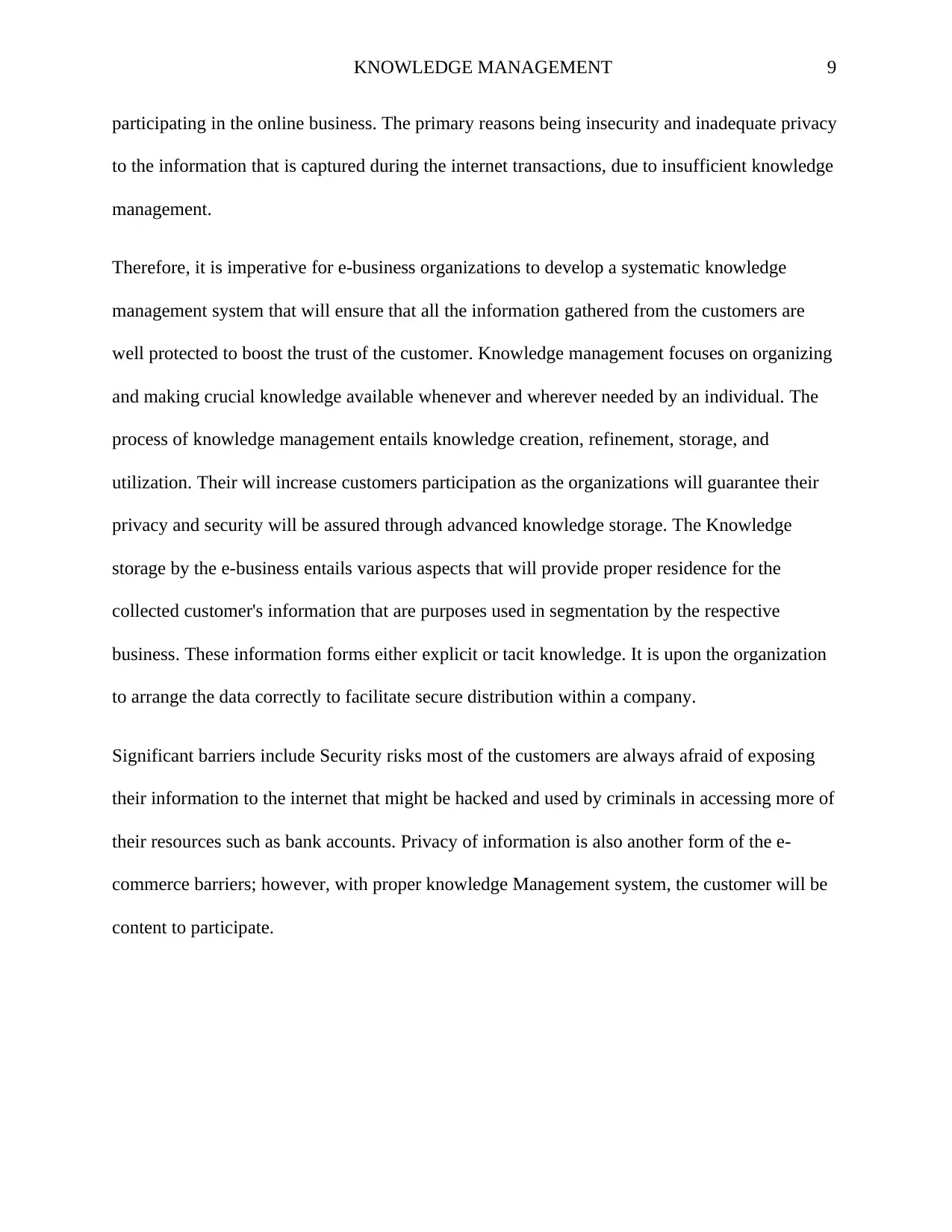
KNOWLEDGE MANAGEMENT 9
participating in the online business. The primary reasons being insecurity and inadequate privacy
to the information that is captured during the internet transactions, due to insufficient knowledge
management.
Therefore, it is imperative for e-business organizations to develop a systematic knowledge
management system that will ensure that all the information gathered from the customers are
well protected to boost the trust of the customer. Knowledge management focuses on organizing
and making crucial knowledge available whenever and wherever needed by an individual. The
process of knowledge management entails knowledge creation, refinement, storage, and
utilization. Their will increase customers participation as the organizations will guarantee their
privacy and security will be assured through advanced knowledge storage. The Knowledge
storage by the e-business entails various aspects that will provide proper residence for the
collected customer's information that are purposes used in segmentation by the respective
business. These information forms either explicit or tacit knowledge. It is upon the organization
to arrange the data correctly to facilitate secure distribution within a company.
Significant barriers include Security risks most of the customers are always afraid of exposing
their information to the internet that might be hacked and used by criminals in accessing more of
their resources such as bank accounts. Privacy of information is also another form of the e-
commerce barriers; however, with proper knowledge Management system, the customer will be
content to participate.
participating in the online business. The primary reasons being insecurity and inadequate privacy
to the information that is captured during the internet transactions, due to insufficient knowledge
management.
Therefore, it is imperative for e-business organizations to develop a systematic knowledge
management system that will ensure that all the information gathered from the customers are
well protected to boost the trust of the customer. Knowledge management focuses on organizing
and making crucial knowledge available whenever and wherever needed by an individual. The
process of knowledge management entails knowledge creation, refinement, storage, and
utilization. Their will increase customers participation as the organizations will guarantee their
privacy and security will be assured through advanced knowledge storage. The Knowledge
storage by the e-business entails various aspects that will provide proper residence for the
collected customer's information that are purposes used in segmentation by the respective
business. These information forms either explicit or tacit knowledge. It is upon the organization
to arrange the data correctly to facilitate secure distribution within a company.
Significant barriers include Security risks most of the customers are always afraid of exposing
their information to the internet that might be hacked and used by criminals in accessing more of
their resources such as bank accounts. Privacy of information is also another form of the e-
commerce barriers; however, with proper knowledge Management system, the customer will be
content to participate.
⊘ This is a preview!⊘
Do you want full access?
Subscribe today to unlock all pages.

Trusted by 1+ million students worldwide
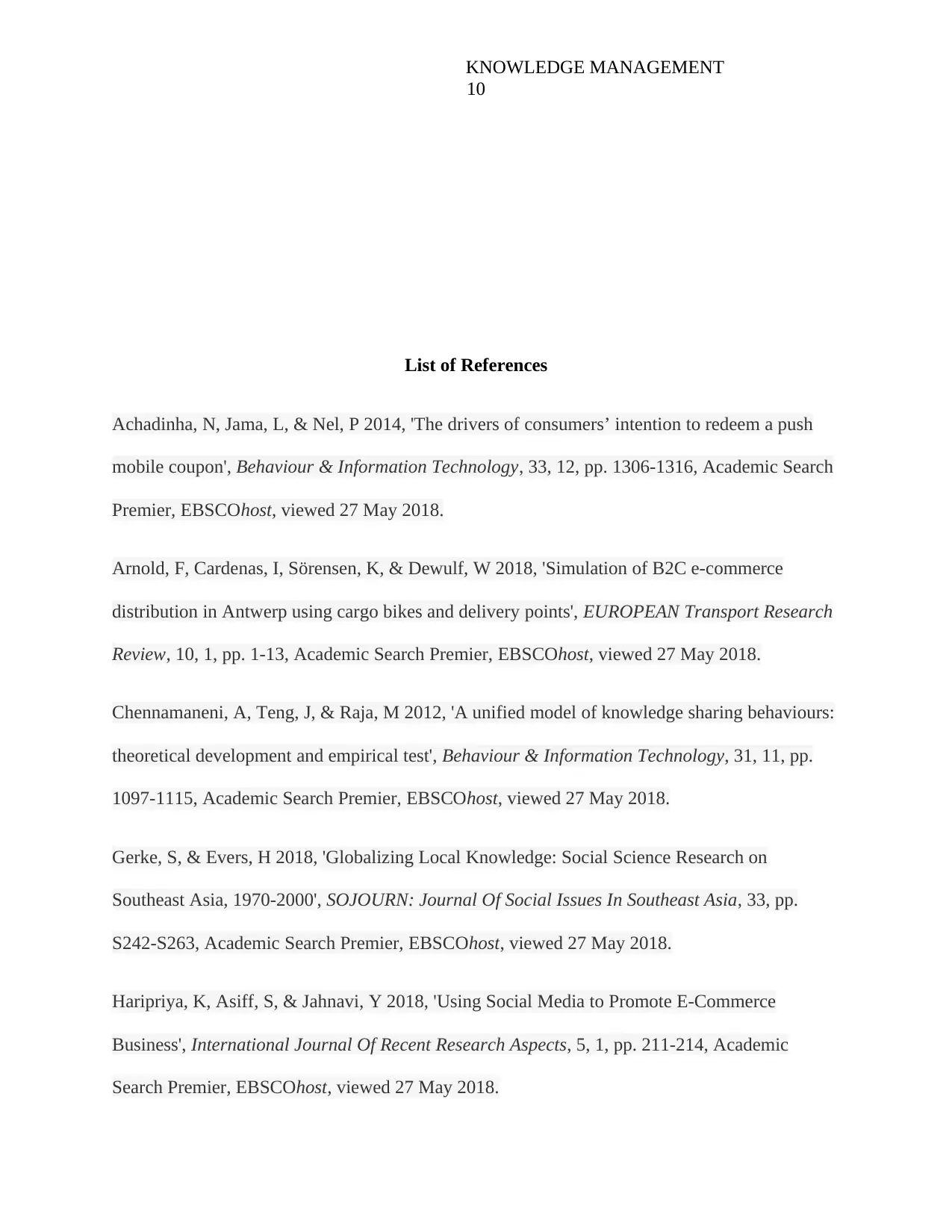
KNOWLEDGE MANAGEMENT
10
List of References
Achadinha, N, Jama, L, & Nel, P 2014, 'The drivers of consumers’ intention to redeem a push
mobile coupon', Behaviour & Information Technology, 33, 12, pp. 1306-1316, Academic Search
Premier, EBSCOhost, viewed 27 May 2018.
Arnold, F, Cardenas, I, Sörensen, K, & Dewulf, W 2018, 'Simulation of B2C e-commerce
distribution in Antwerp using cargo bikes and delivery points', EUROPEAN Transport Research
Review, 10, 1, pp. 1-13, Academic Search Premier, EBSCOhost, viewed 27 May 2018.
Chennamaneni, A, Teng, J, & Raja, M 2012, 'A unified model of knowledge sharing behaviours:
theoretical development and empirical test', Behaviour & Information Technology, 31, 11, pp.
1097-1115, Academic Search Premier, EBSCOhost, viewed 27 May 2018.
Gerke, S, & Evers, H 2018, 'Globalizing Local Knowledge: Social Science Research on
Southeast Asia, 1970-2000', SOJOURN: Journal Of Social Issues In Southeast Asia, 33, pp.
S242-S263, Academic Search Premier, EBSCOhost, viewed 27 May 2018.
Haripriya, K, Asiff, S, & Jahnavi, Y 2018, 'Using Social Media to Promote E-Commerce
Business', International Journal Of Recent Research Aspects, 5, 1, pp. 211-214, Academic
Search Premier, EBSCOhost, viewed 27 May 2018.
10
List of References
Achadinha, N, Jama, L, & Nel, P 2014, 'The drivers of consumers’ intention to redeem a push
mobile coupon', Behaviour & Information Technology, 33, 12, pp. 1306-1316, Academic Search
Premier, EBSCOhost, viewed 27 May 2018.
Arnold, F, Cardenas, I, Sörensen, K, & Dewulf, W 2018, 'Simulation of B2C e-commerce
distribution in Antwerp using cargo bikes and delivery points', EUROPEAN Transport Research
Review, 10, 1, pp. 1-13, Academic Search Premier, EBSCOhost, viewed 27 May 2018.
Chennamaneni, A, Teng, J, & Raja, M 2012, 'A unified model of knowledge sharing behaviours:
theoretical development and empirical test', Behaviour & Information Technology, 31, 11, pp.
1097-1115, Academic Search Premier, EBSCOhost, viewed 27 May 2018.
Gerke, S, & Evers, H 2018, 'Globalizing Local Knowledge: Social Science Research on
Southeast Asia, 1970-2000', SOJOURN: Journal Of Social Issues In Southeast Asia, 33, pp.
S242-S263, Academic Search Premier, EBSCOhost, viewed 27 May 2018.
Haripriya, K, Asiff, S, & Jahnavi, Y 2018, 'Using Social Media to Promote E-Commerce
Business', International Journal Of Recent Research Aspects, 5, 1, pp. 211-214, Academic
Search Premier, EBSCOhost, viewed 27 May 2018.
Paraphrase This Document
Need a fresh take? Get an instant paraphrase of this document with our AI Paraphraser
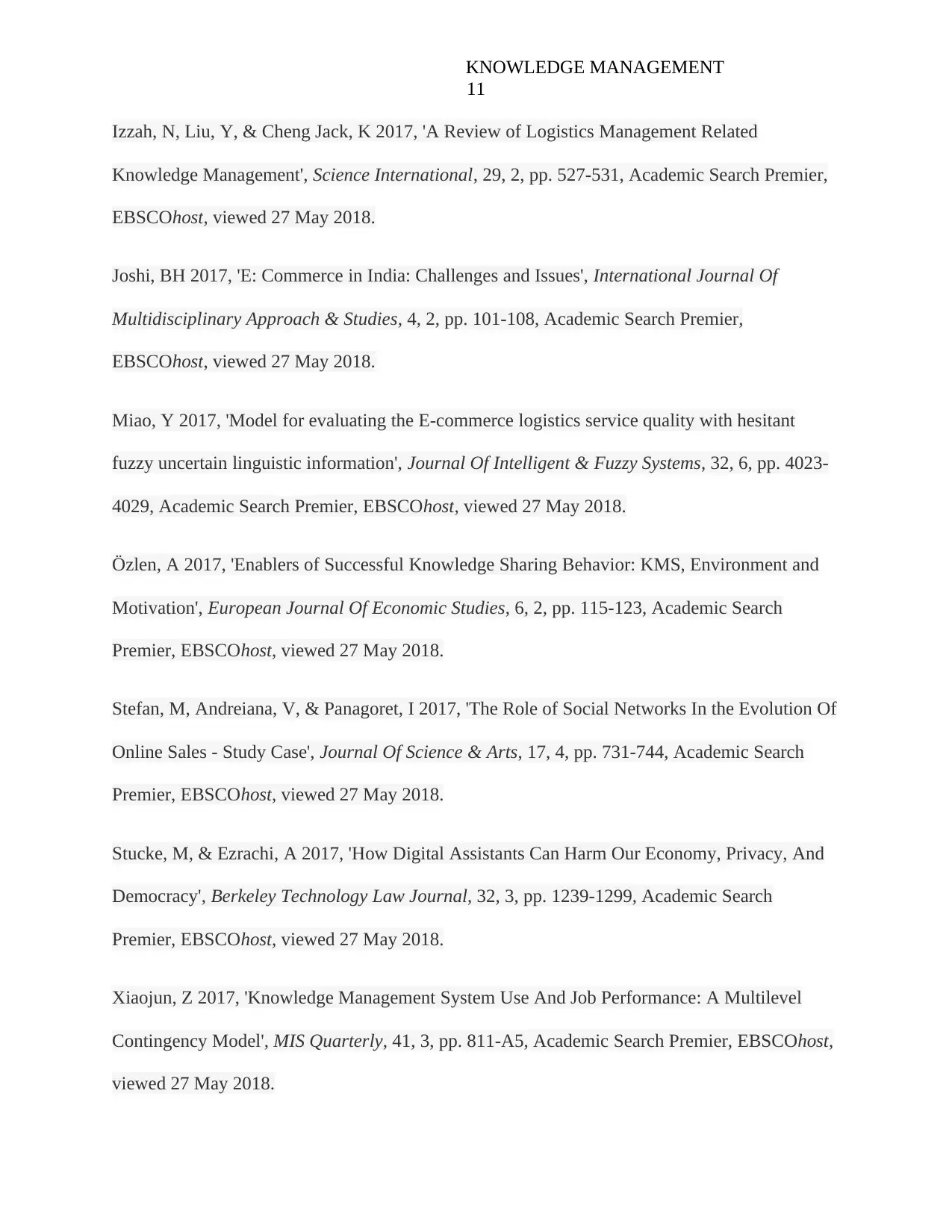
KNOWLEDGE MANAGEMENT
11
Izzah, N, Liu, Y, & Cheng Jack, K 2017, 'A Review of Logistics Management Related
Knowledge Management', Science International, 29, 2, pp. 527-531, Academic Search Premier,
EBSCOhost, viewed 27 May 2018.
Joshi, BH 2017, 'E: Commerce in India: Challenges and Issues', International Journal Of
Multidisciplinary Approach & Studies, 4, 2, pp. 101-108, Academic Search Premier,
EBSCOhost, viewed 27 May 2018.
Miao, Y 2017, 'Model for evaluating the E-commerce logistics service quality with hesitant
fuzzy uncertain linguistic information', Journal Of Intelligent & Fuzzy Systems, 32, 6, pp. 4023-
4029, Academic Search Premier, EBSCOhost, viewed 27 May 2018.
Özlen, A 2017, 'Enablers of Successful Knowledge Sharing Behavior: KMS, Environment and
Motivation', European Journal Of Economic Studies, 6, 2, pp. 115-123, Academic Search
Premier, EBSCOhost, viewed 27 May 2018.
Stefan, M, Andreiana, V, & Panagoret, I 2017, 'The Role of Social Networks In the Evolution Of
Online Sales - Study Case', Journal Of Science & Arts, 17, 4, pp. 731-744, Academic Search
Premier, EBSCOhost, viewed 27 May 2018.
Stucke, M, & Ezrachi, A 2017, 'How Digital Assistants Can Harm Our Economy, Privacy, And
Democracy', Berkeley Technology Law Journal, 32, 3, pp. 1239-1299, Academic Search
Premier, EBSCOhost, viewed 27 May 2018.
Xiaojun, Z 2017, 'Knowledge Management System Use And Job Performance: A Multilevel
Contingency Model', MIS Quarterly, 41, 3, pp. 811-A5, Academic Search Premier, EBSCOhost,
viewed 27 May 2018.
11
Izzah, N, Liu, Y, & Cheng Jack, K 2017, 'A Review of Logistics Management Related
Knowledge Management', Science International, 29, 2, pp. 527-531, Academic Search Premier,
EBSCOhost, viewed 27 May 2018.
Joshi, BH 2017, 'E: Commerce in India: Challenges and Issues', International Journal Of
Multidisciplinary Approach & Studies, 4, 2, pp. 101-108, Academic Search Premier,
EBSCOhost, viewed 27 May 2018.
Miao, Y 2017, 'Model for evaluating the E-commerce logistics service quality with hesitant
fuzzy uncertain linguistic information', Journal Of Intelligent & Fuzzy Systems, 32, 6, pp. 4023-
4029, Academic Search Premier, EBSCOhost, viewed 27 May 2018.
Özlen, A 2017, 'Enablers of Successful Knowledge Sharing Behavior: KMS, Environment and
Motivation', European Journal Of Economic Studies, 6, 2, pp. 115-123, Academic Search
Premier, EBSCOhost, viewed 27 May 2018.
Stefan, M, Andreiana, V, & Panagoret, I 2017, 'The Role of Social Networks In the Evolution Of
Online Sales - Study Case', Journal Of Science & Arts, 17, 4, pp. 731-744, Academic Search
Premier, EBSCOhost, viewed 27 May 2018.
Stucke, M, & Ezrachi, A 2017, 'How Digital Assistants Can Harm Our Economy, Privacy, And
Democracy', Berkeley Technology Law Journal, 32, 3, pp. 1239-1299, Academic Search
Premier, EBSCOhost, viewed 27 May 2018.
Xiaojun, Z 2017, 'Knowledge Management System Use And Job Performance: A Multilevel
Contingency Model', MIS Quarterly, 41, 3, pp. 811-A5, Academic Search Premier, EBSCOhost,
viewed 27 May 2018.
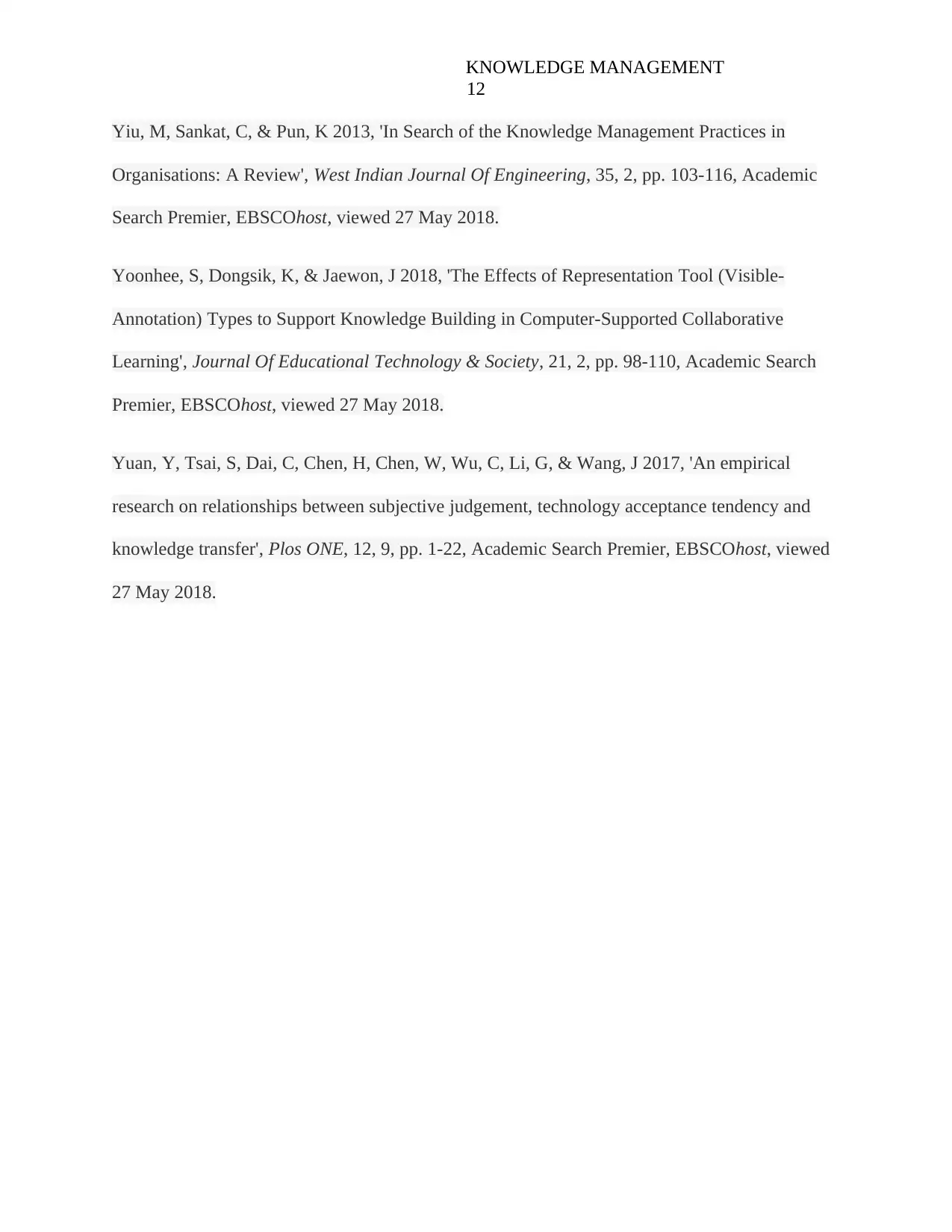
KNOWLEDGE MANAGEMENT
12
Yiu, M, Sankat, C, & Pun, K 2013, 'In Search of the Knowledge Management Practices in
Organisations: A Review', West Indian Journal Of Engineering, 35, 2, pp. 103-116, Academic
Search Premier, EBSCOhost, viewed 27 May 2018.
Yoonhee, S, Dongsik, K, & Jaewon, J 2018, 'The Effects of Representation Tool (Visible-
Annotation) Types to Support Knowledge Building in Computer-Supported Collaborative
Learning', Journal Of Educational Technology & Society, 21, 2, pp. 98-110, Academic Search
Premier, EBSCOhost, viewed 27 May 2018.
Yuan, Y, Tsai, S, Dai, C, Chen, H, Chen, W, Wu, C, Li, G, & Wang, J 2017, 'An empirical
research on relationships between subjective judgement, technology acceptance tendency and
knowledge transfer', Plos ONE, 12, 9, pp. 1-22, Academic Search Premier, EBSCOhost, viewed
27 May 2018.
12
Yiu, M, Sankat, C, & Pun, K 2013, 'In Search of the Knowledge Management Practices in
Organisations: A Review', West Indian Journal Of Engineering, 35, 2, pp. 103-116, Academic
Search Premier, EBSCOhost, viewed 27 May 2018.
Yoonhee, S, Dongsik, K, & Jaewon, J 2018, 'The Effects of Representation Tool (Visible-
Annotation) Types to Support Knowledge Building in Computer-Supported Collaborative
Learning', Journal Of Educational Technology & Society, 21, 2, pp. 98-110, Academic Search
Premier, EBSCOhost, viewed 27 May 2018.
Yuan, Y, Tsai, S, Dai, C, Chen, H, Chen, W, Wu, C, Li, G, & Wang, J 2017, 'An empirical
research on relationships between subjective judgement, technology acceptance tendency and
knowledge transfer', Plos ONE, 12, 9, pp. 1-22, Academic Search Premier, EBSCOhost, viewed
27 May 2018.
⊘ This is a preview!⊘
Do you want full access?
Subscribe today to unlock all pages.

Trusted by 1+ million students worldwide
1 out of 12
Related Documents
Your All-in-One AI-Powered Toolkit for Academic Success.
+13062052269
info@desklib.com
Available 24*7 on WhatsApp / Email
![[object Object]](/_next/static/media/star-bottom.7253800d.svg)
Unlock your academic potential
Copyright © 2020–2026 A2Z Services. All Rights Reserved. Developed and managed by ZUCOL.





